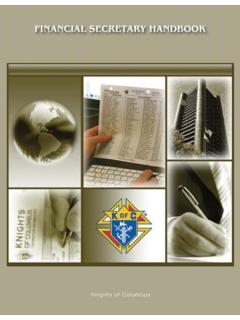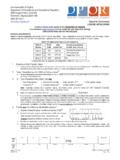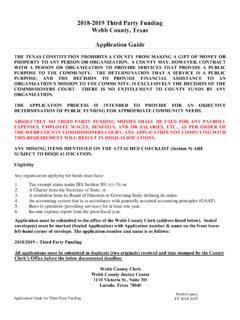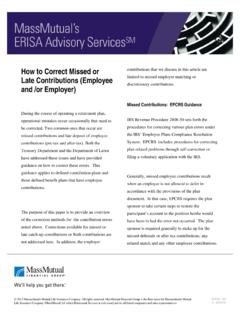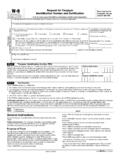Transcription of MEMORANDUM - Mississippi Knights of Columbus
1 MEMORANDUM . TO: All State and Local Councils, Assemblies, and Chapters in the United FROM : John Marrella, Supreme Advocate DATE : April 2013. SUBJECT: 2012 Federal Tax Returns All Knights of Columbus subordinate units in the United States must file an annual informational tax return (IRS Form 990) with the Internal Revenue Service (IRS). This MEMORANDUM provides general guidance to help councils comply with their federal tax reporting requirements for 2012. Although the Knights of Columbus Legal Department is able to provide general guidance, we recommend that councils, assemblies, and chapters that have more complicated tax returns consult with a professional tax adviser. I. General Information The Knights of Columbus is a fraternal benefit society, recognized by the IRS as a tax- exempt organization under Section 501(c)(8) of the Internal Revenue Code (IRC). In addition, pursuant to a group exemption, the IRS recognizes all councils 1 in the United States as fraternal lodges.
2 Each council may also claim an exemption from federal income tax under Section 501(c)(8), provided that the Financial Secretary has reported the council's Employer Identification Number (EIN) to the Knights of Columbus Legal Department, which in turn will report it to the IRS as part of the Knights of Columbus group exemption listing. In order to be recognized under the Order's group exemption, a council must first obtain its own EIN from the IRS by submitting a Form SS-4 to the IRS. attachment 1 to this MEMORANDUM includes (1) a sample Form SS-4 for you to use as a guide; and (2) a blank copy for you to fill out and submit to the IRS. Once a council has received its EIN, it must submit to the Knight of Columbus Legal Department a copy of the letter from the IRS assigning it an EIN. In addition to the letter from the IRS, the council must also submit to the Legal Department an 1.
3 For the purposes of this document, the term "council" refers to all subordinate units of the Knights of Columbus , including state and local councils, assemblies, and chapters. MEMORANDUM Page 1. authorization letter (see attachment 2), requesting that it be included in the Supreme Council's group exemption. attachment 3 to this MEMORANDUM includes: (1) a letter issued by the IRS to the Supreme Council in 1940, recognizing the federal income tax exemption for the Supreme Council and its subordinate units (the group exemption ); and (2) a letter issued by the IRS to the Supreme Council in 1998, confirming this exemption. Councils should file their returns directly with the IRS and should not submit originals or copies to the Knights of Columbus Legal Department. If a council fails to comply with the annual filing requirement, the IRS may impose monetary and other penalties, including revocation of the council's tax exempt status.
4 The Order's group exemption does not exempt councils from state and local taxes. For example, councils may be subject to state or local sales taxes, unless state or local laws specifically exempt these entities. Typically, states grant sales tax exemptions only to organizations that are recognized as charitable entities under Section 501(c)(3) of the IRC; as a fraternal benefit society under Section 501(c)(8), the Knights of Columbus would not be entitled to this exemption. Each council should consult its own tax adviser, accountant, or legal counsel to determine whether it is exempt from state and local taxes. Finally, the Knights of Columbus group exemption recognized by the IRS does not extend to home corporations or home associations, which are independent legal entities. II. Who Must File Every council, assembly, and chapter in the United States must file a return with the IRS.
5 The type of return that is required to be filed will ordinarily depend on the amount of gross receipts generated by the council. Councils with annual gross receipts of $50,000 or less must electronically file a Form 990-N with the IRS. 2 (See attachment 4, section entitled Annual Electronic Filing Requirement for Knights of Columbus Subordinate Councils ). Under Section 6033 of the IRC, tax exempt organizations with annual gross receipts of more than $50,000, must file an annual information return with the IRS that reports: the organization's income;. the organization's expenses;. changes in the organization's fund balances; and a balance sheet. 2. We suggest that each council use the Worksheet for IRS Form 990 and Form 990-EZ Gross Receipts Test to determine which filing, if any, must be made. (See attachment 4). Councils should carefully follow the Supplemental Instructions for IRS Form 990-EZ (see attachment 5) and Form 990 (see attachment 6), and should retain copies of their worksheet calculations.
6 MEMORANDUM Page 2. Councils with annual gross receipts of $50,001 to $199,999 should use Form 990-EZ, while councils with annual gross receipts equal to or greater than $200,000 (or total assets of $500,000 or more) should use Form 990. Councils that earned $1,000 or more in gross income from an unrelated business must also file Form 990-T (Exempt Organization Business Income). to compute and pay the tax due. Attached to this MEMORANDUM are supplemental instructions to assist your council in filing its Form 990 or Form 990-EZ. (See Attachments 5 and 6). Each council must file its own tax return; there is no group or consolidated Form 990. filing. The returns are due to be filed by the fifteenth day of the fifth month following the end of the council's annual accounting period. 3 Federal law imposes a penalty of $20 per day, up to a maximum of $10,000, for incomplete or late filings, unless reasonable cause can be shown.
7 The Form 990-N (e-postcard) can only be filed online and you may do so by following these steps: 1. Access the IRS website by clicking this link: Profits/Annual-Electronic-Filing-Require ment-for-Small-Exempt-Organizations--For m- 990-N-%28e-Postcard%29. 2. Under the heading How to File read the paragraph and click the link; and 3. Read the disclaimer and then click leave IRS website . That will take you to the privately owned website where you can access and file the Form 990-N. Councils that are required to file a Form 990 or Form 990-EZ 4 should send the completed return to: Internal Revenue Service Center Ogden, UT 84201-0027. III. Maintaining Tax Files Each council should, at a minimum, maintain a tax file that includes copies of the following: The council's by-laws and all amendments;. 3. For example, if a council's accounting period ends on December 31, it must file by the following May 15; if its accounting period ends on June 30, it must file by November 15.
8 4. If your council is required to file a return, but did not automatically receive the appropriate tax forms and instructions from the IRS, you may obtain them from the IRS, by calling the IRS forms number (1-800-829-3676), or by downloading forms from the IRS website at Requests for an extension to file (Form 8868). should be sent to the Ogden Service Center at the above address. MEMORANDUM Page 3. The council's minutes for the last four years;. IRS group exemption letters dated October 25, 1940 and October 15, 1998 (See attachment 3);. Forms 990, Forms 990-EZ, or Forms 990-N filed for the last 10 years;. The following forms filed by the council in the last 10 years: Summary Form 1096. and Information Return for Income Payments (Form 1099), if any; Summary Form W-3 and Income Tax Withheld on Wages (Forms W-2), if any;. The council's application (Form SS-4) for its Employer Identification Number.
9 Tax returns for the last five years filed under the Federal Insurance Contribution Act and the Federal Unemployment Tax Act, if any;. Any prior revenue agent examination reports; and Forms 990 and 990-EZ worksheets for those years, if any, in which gross receipts were less than the $50,000 threshold amount. Faithful Comptrollers and Financial Secretaries should maintain, at the organization's principal place of business, a file that includes the above-mentioned group exemption letters, and Forms 990 and/or Forms 990-EZ filed in the previous three years. Under federal law, this file must be open to public inspection during regular business hours, and copies of the filings must be provided to anyone who requests them, at the cost to the requester. 5. IV. Home Corporations A. Defined Councils and assemblies are unincorporated associations that may not hold title to real estate.
10 State law, however, allows council members to establish home corporations as non-stock, non- profit corporations that may qualify as tax-exempt organizations under IRC Section 501(c)(2). (title holding company) or Section 501(c)(7) (social club). To qualify as a title-holding company under Section 501(c)(2), the home corporation's income must be earned solely from the rental of the real estate, or other passive sources. If a home corporation receives income from business sources, such as from the operation of a bar, or from gaming, then it must operate as a social club under Section 501(c)(7). Liquor licenses must be held in the name of the home corporation and not the council. Membership in the home corporation is restricted to those council members in good standing; when a person's membership is terminated, his home corporation membership 5. Failure to comply with this requirement is punishable under Section 6652 of the IRC, by a fine of $20 per day of non-compliance, up to a maximum of $10,000.
